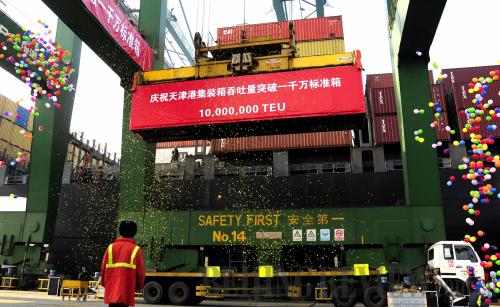|
 |
|
BUSY TIANJIN: By December 29, 2010, Tianjin Port had handled 10 million standard containers since the beginning of 2010, allowing the port to ascend to the world class port level (XUE LIQIANG) |
Numbers of the Week
117.8 billion yuan
China's software industry revenue rose 30.7 percent year on year to 117.8 billion yuan ($17.7 billion) in November, said the Ministry of Industry and Information Technology.
57.66 billion yuan
Chinese insurers gained combined profits of about 57.66 billion yuan ($8.7 billion) in the first 11 months of 2010, an increase of 25.1 percent year on year, said Wu Dingfu, Chairman of the China Insurance Regulatory Commission.
TO THE POINT: The central bank toughens its effort to tame inflation by raising interest rates for the second time in 2010. The government rolls back some of its stimulus measures for the auto market, taking heat out of the red-hot industry. Chinese exporters are facing serious headwinds despite increased Christmas orders. Industrial enterprises continue to gain steam, with their January-to-November profits growing 49.4 percent year on year. The accounting firm PwC expects China to experience a consumption boom over the next few years.
By HU YUE
Interest Rate Hike
The People's Bank of China, the central bank, on December 26 raised interest rates the second time in 2010, to tame inflation.
The one-year benchmark deposit rate will rise to 2.75 percent from 2.5 percent while the one-year benchmark lending rate will increase by the same 25 basis points to 5.81 percent, said the central bank.
China's consumer price index (CPI), the main gauge of inflation, rose 5.1 percent year on year in November, a 28-month record. Meanwhile, the residents' price satisfaction index sank to an 11-year low of 13.8 percent in the fourth quarter, according to a central bank-conducted survey of over 20,000 residents in 50 cities.
The government has been pulling on a number of policy levers to rein in inflation. The central bank's vice governor Hu Xiaolian said China would bring its overall money supply to a normal level using various policy tools.
The rate increase came at the right time, as Western countries were celebrating the Christmas holiday, to avoid overreaction from the global markets, said Li Daokui, member of the Monetary Policy Committee of the central bank and an economics professor at Tsinghua University.
Lu Ting, an economist at the Bank of America-Merrill Lynch in Hong Kong said the central bank will probably feel less pressure to act as inflation cools in coming months. He forecast December's CPI growth will ease to 5 percent, and in the first half of 2011, the CPI is likely to grow between 4.5 and 5 percent.
"We don't expect more aggressive rate hikes because Beijing still takes growth as the top priority," he said.
No More Stimulus
The Ministry of Finance and the State Administration of Taxation announced to resume levying a 10-percent purchase tax on vehicles with engine sizes of 1.6 liters or less beginning in 2011.
The government halved the purchase tax from 10 percent to 5 percent on smaller cars in 2009 to spur the use of clean and fuel-efficient cars and bolster domestic consumption amid the economic downturn. The tax rate was then raised to 7.5 percent in 2010.
The generous policy incentives have injected fresh steam into the auto market. In 2009, China overtook the United States to become the world's largest auto market by selling 13.65 million vehicles, up 46 percent year on year.
Auto sales are expected to hit 18 million units in 2010 as the sales from January to November this year reached 16.4 million units, according to data from the China Association of Automobile Manufacturers.
"China introduced the favorable tax policy in 2009 as an effort to combat the ripple effect of the financial crisis. But now the policy needs to be adjusted since the country has emerged from the economic quagmire," said Liu Shangxi, Deputy Director of the Research Institute of Fiscal Science under the Ministry of Finance.
The withdrawal of stimulus is likely to take some steam out of the auto market in 2011, said Jia Xinguang, a renowned independent auto analyst.
Christmas Chill
Although Chinese exporters saw an increase of Christmas orders, their profit woes still linger.
| 